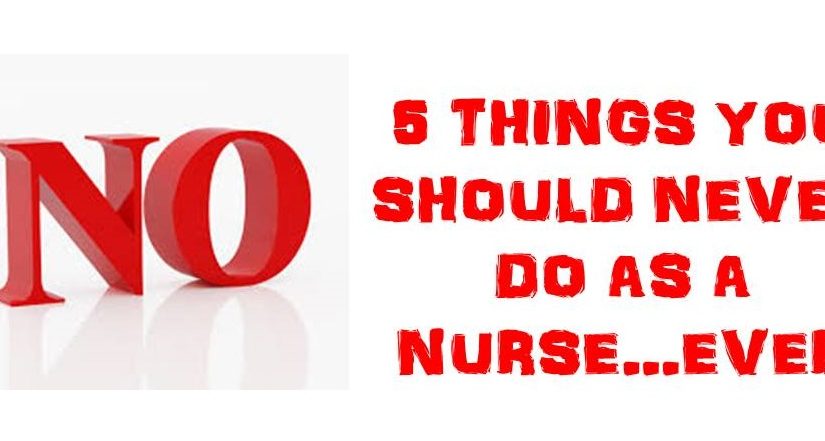Nurses are a strange bunch with superstitions – whether we want to admit it or not. For some of the smartest people on the planet (more so than rocket scientists or…doctors…in some cases), we sure get bent out of shape when someone says certain phrases.
As nurses, we have learned the hard way to never say certain statements. Why? Well, that could be because the first time we said it – or heard it said – we got the “evil eye”. Think back to the time you first heard some naive soul say, “Wow, it sure is quiet today!” “Sure is slow”, “Nothing has happened today”, “We haven’t had a code this week”, and comments of the like – just are not acceptable!
If you are an experienced nurse (even with one day of experience), you will be able to testify to what will happen to the unfortunate employee who makes such a claim, right?! Let’s just say that person is not the most popular person on the unit!
It is a fact. Some sayings are just taboo! What does that even mean? Taboo is, by definition, a social or religious custom prohibiting or forbidding discussion of a particular practice, or forbidding association with a particular person, place or thing. It is something that is prohibited or restricted by social custom.
We knock on wood if we say we have been having a good week, or we may reach out to touch the face of a beautiful child who is our patient so they don’t have a turn for the worse. We cross ourselves and say a prayer when someone mentions the drug seeking patient (not currently a patient) who goes on a rampage when the doctor refuses to order the dilaudid. Therefore, speaking of such topics are prohibited!
So, what other topics is it that we as nurses don’t want to hear? What is it that really grates on our nerves? Here are a few sayings…and the rationale behind it!
I interviewed some top notch nurses I know, and here is what they have to say on the subject:
1.~Karen Martinez: “We’re slow today”. Why? It causes the floodgates to open wide and you will probably never get a potty break the rest of your shift!
2.~Sylvia Nelson: “Our anesthesiologists have a thing against saying a child is calm, because then they wake up like a demon. i will never tell my surgeon i hope their night is quiet!”
3.~Jennifer Collins: “It’s been a good day!” That’s when the **** hits the fan. Wait until your shift is over and you have given report!
4.~Ashley Elizabeth: “I have a fantastic assignment!” – There is no such thing if you say it before the end of your shift….; “Calling a patient a ‘stable vented patient’” will cause them to not be stable for long – you will be running a code in no time; “This patient is an easy stick.” Your patient will suddenly become a turnip.
5.~Cherrie Aquino: “Telling parents, “Oh, he/she is the BEST IV starter!” Your patient will be a scientific marvel and have no veins.
6.~Elissa Norris: “Don’t ever mention the chronic kid (or adult patient) that has a crazy mom (or wife/husband/family member) – inevitably they show up!”
7.~Carol Kaplan: “You should never, ever, repeat the name of a ‘repeat offender’ patient. You will admit that patient on your shift!”
8.~Diana Montalvo: “The doctor will be in – just a few minutes.” The doctor will not even be in the building…maybe not even in the country, since you said it!
9.~Sarah Weishuhn: “As a surgical nurse, we never say, ‘Wow, there aren’t any add on cases today?!’ Because five minutes later, the bottom will fall out and we will have an open fracture, an appy, and a C-section…NOW!”
10.~Sandra Cambridge: “Never comment on how well behaved a pediatric patient is until they are walking out the door.” unless you wish to come face to face with the devil with the parent who has no control or expects you to be the nanny.
We learn to never say words like, ‘quiet’, ‘boring’, ‘easy’. We never attribute these qualities to our patient(s), or the shift. We have learned, from having to jump in the trenches after these words are uttered, that these words will open up the gates of Hades and set forth a war that will cause you to have to wage battle against until your shift is “supposed” to be over.
We learn to bask in the warmth of silence or calmness that may befall our units without having to think about – much less comment about – the fact!
We never mention that we will be discharging all of our patients and request to leave when we have no more patients to care for….for good reasons! We know what will happen if we do. Not only will you be discharging all of your patients, but you will be the admitting nurse for all of the ones that ED will be sending up – because inevitably, some brickhead in the ED said, “Sure is quiet today!”
What sayings are taboo in your field?










